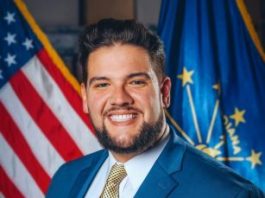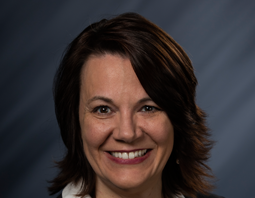Marilyn Odendahl for www.theindianalawyer.com
When the recession in the early 1980s snuffed out more blast furnaces in Gary’s steel mills, lines quickly formed at the local welfare office as laid-off steelworkers applied for assistance.

Inside that office, applications for food stamps were not being processed within the federally mandated 30-day limit. And despite the federal law requiring the agency to have an interpreter for Spanish speakers, staff members would tap the building’s elevator operator to translate.
About this time, Judy Stanton, a mother of five and self-described “late bloomer,†walked into the offices of the Legal Service Program of Greater Gary as a brand new attorney. It was September 1980 and she was put on the team handling a lawsuit challenging the untimely processing of food stamp applications.
The case underscored her commitment to the principle of fairness and helped establish her reputation as a poverty law expert. Since then, she has spent 34 years working mostly in legal services for low-income clients who were fighting for food and medical or disability benefits.
She took a brief turn in private practice before returning to poverty law by becoming the first pro bono district plan administrator for northwest Indiana in 2001. Now, at the close of 2014, she is leaving her position in the district called NWI Volunteer Lawyers Inc.
Stanton is quick to correct the assumption that she is retiring.
“I’m stepping down,†she said, “but I’m not going away.†She plans to volunteer as an attorney at the pro bono office and will remain on several boards including Indiana Legal Services and the Indiana Commission to Expand Access to Civil Legal Services. Also, she will be joining the board of the neighboring pro bono district that includes LaPorte County, where she lives.
The light bulb went on
Stanton was not immediately attracted to the law. She graduated from Saint Mary’s College in Notre Dame, Indiana, and started a family.
In the mid-1970s, she read an article in her alumni magazine about lawyers. One paragraph in the article listed the skills, such as writing, analysis and advocacy, an attorney uses and that is when, in Stanton’s words, a light bulb went on in her head.
With a house full of children ranging in age from toddlers to teenagers, the Hobart housewife enrolled at the Valparaiso University Law School.
Another spark was lit when she was introduced to poverty law as part of the school’s clinical program. There she learned about the government support available to people. She also learned Indiana’s eligibility standards were so low, recipients were booted off the minute they tried to support themselves.
The unfairness nagged at Stanton.
“I have some favorite words like peace, love, and the one that really gets me going is justice,†she said. “Things need to be fair.â€
Colleagues who have worked with Stanton often point to her vast abilities. She knows the law but she also knows how to apply it, how to connect with clients and how to work with those on the opposing side.
“Judy is that really rare combination of incredible legal talent, dedication to clients and a capacity for hard work,†said Dave Yoder, former executive director of Legal Service Program of Greater Gary. “I remember Judy very well as someone who could always be counted on to go the extra mile for our clients.â€
Sister Peg Spindler, executive director of the Sojourner Truth House in Gary, has seen Stanton’s passion for the marginalized. “She’s always up for a fight when it comes to protecting these folks,†Spindler said.
Food stamps
Reflecting on her tenure as a lawyer, Stanton paused at the question of whether poor relief is fairer now than when she started practicing law.
“Some things have improved, some things have not, some things have gotten worse,†she said. “It’s a complicated area.â€
The food stamp situation in Gary was an example of unfairness. Federal law required the applications for food stamps be processed within 30 days but, as Stanton explained, the Lake County Public Welfare office was way off target.
After a hearing, the U.S. District Court for the Northern District of Indiana found the state had violated 11 provisions of the federal Food Stamp Act and set a deadline for the state to take corrective action.
The state appealed, asserting that private citizens who applied for food stamps had no right to sue under the Food Stamp Act.
With the help of law students, Stanton researched the legislative history of the food assistance program and learned Congress had never expressly barred individuals from bringing lawsuits, even when the Act was amended.
Stanton argued the case before the 7th Circuit Court of Appeals and the panel unanimously affirmed the District Court’s ruling in Haskins v. Stanton, 794 F.2d 1273 (1986).
The details of appearing in the appellate courtroom have become hazy, but Stanton is still clear on the result.
“It meant that (county residents) would get the ability to have food for their families a whole lot faster than what they had been,†she said. “You can always pay your rent later, you can pay your utility bills later, but you can’t eat tomorrow what you didn’t eat today.â€
That knowledge of the law, analytic ability, tenacity and compassion are what attorney William Longer admires about Stanton. The two shared office space and a secretary when they were both solo practitioners in Hobart in the late 1990s. Often during the day, they would pause over coffee to trade ideas and advice.
“I enjoyed having conversations with Judy because when you throw out a statement, if there’s a legal flaw in it, she’ll point it out,†Longer said. “She makes you think. It’s fun.â€
Pro bono district
Stanton said a recurring theme in her work with government benefits is that the programs often posed an obstacle to those trying to become self-supportive.
Working in legal aid in the 1990s when welfare reform was a top priority, Stanton said the perception was that women were having children out of wedlock just so they could get welfare benefits. Yet, the system was such that if they tried to work, they lost their Medicaid and child care subsidies.
She encountered this attitude when she spent several years representing the interests of legal aid clients at the Indiana Legislature. She remembered one effort by the General Assembly to have Medicaid recipients make a co-pay for their care.
Stanton first reminded the legislators that the maximum welfare benefit for a household with two children had not been increased since the 1970s.
“I said, ‘They are willing to do this but they just want you to say, should they deduct the $5 from their rent or from their utility bill because what may seem like pocket change to us, to them it’s the difference between eating or having heat,’†she said.
Since becoming head of the pro bono district, Stanton has also been credited with starting innovative programs that other districts have emulated. She has solicited private support, found ways to move forward with reduced funding, and organized special recognition events for the volunteer attorneys.
“What’s frustrating is we can help the people who are under 125 percent (of the Federal Poverty Level) but there’s this other group, the working poor, that still can’t afford an attorney,†Stanton said. “So the attorneys have a responsibility to the system.â€
For Stanton, her work in legal aid and pro bono has been a source of joy.
“I think I like the variety as well as the feel good part,†she said. “We had the opportunity to do impact cases or class-action cases that didn’t just fix one person’s problem but helped a whole lot of people.â€â€¢



